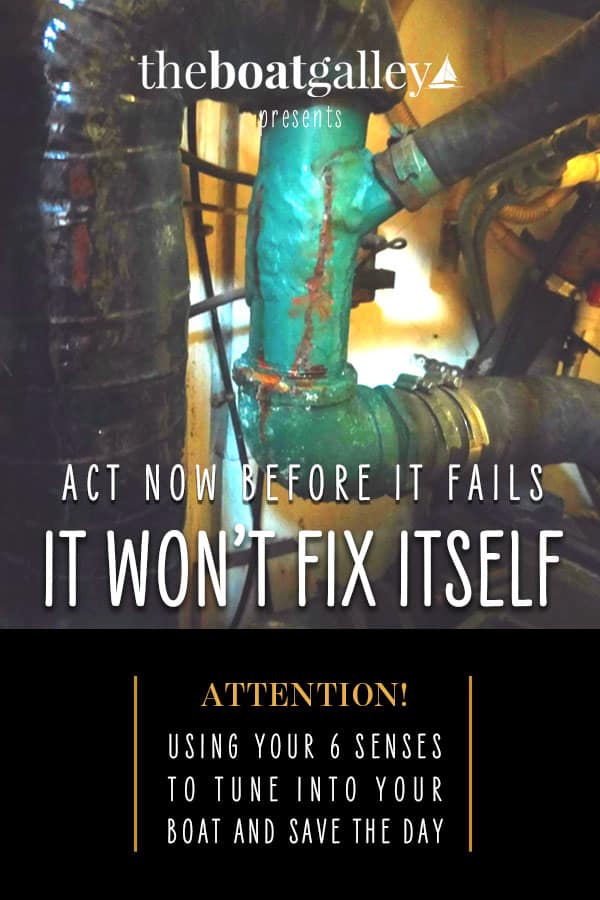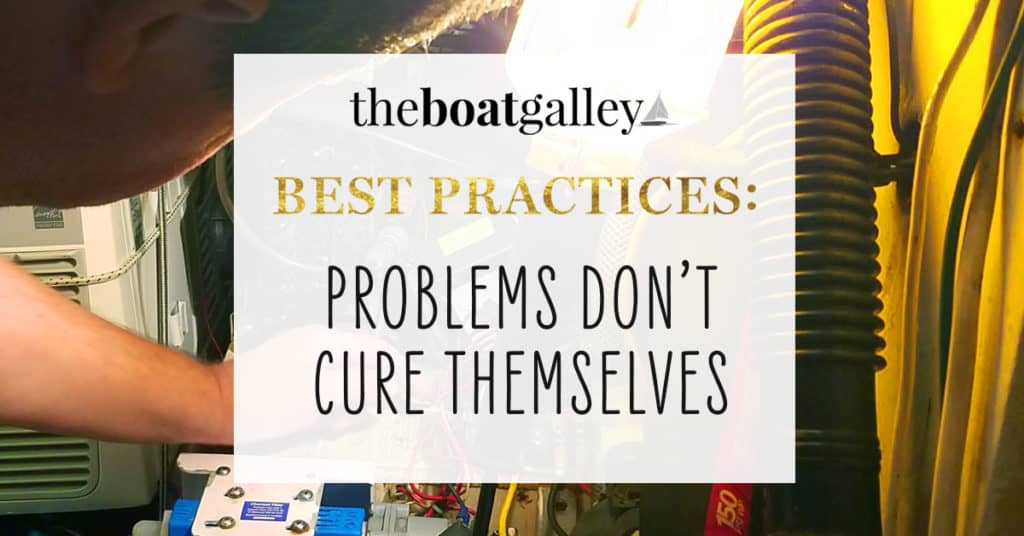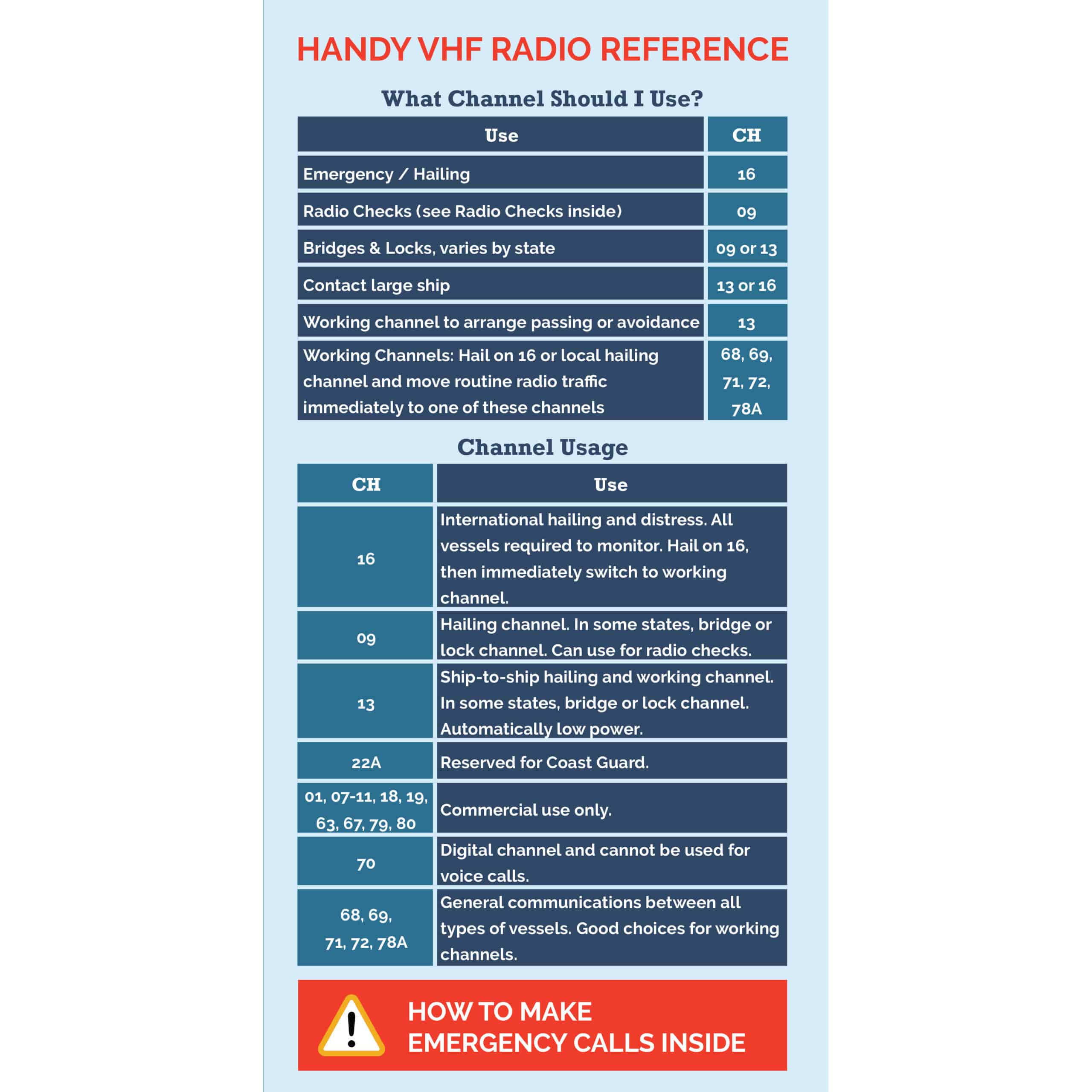What do you do when you discover problems on a boat?

Uggh! I’m about two hours late in even sitting down at the computer today. As I was starting to make coffee this morning, I detected just a hint of a funky smell. And if there’s one thing I know, it’s:
Problems don’t cure themselves. They just get worse.
And that’s doubly true of problems on a boat.
When we started cruising Que Tal, we knew this. But we didn’t KNOW it. A tiny problem didn’t necessarily give us a sense of urgency. It was something that went on the “to do” list. Before the first month was out, we’d changed the way we did things.
See a drop of water in an unexpected place? Used to be we’d just wipe it up. We learned to find out why it was there. Hmm, those couple of drops under the watermaker might have been a hint that a connector was about to break in two and put a steady stream of salt water on the settee.
A funky whiff coming from the hammock of veggies should have been investigated before the flying insects found the rotten potatoes.
Finding a Gatorade bottle with a loose cap should have encouraged me to check the bottom of the refrigerator before the goo became moldy.
Enough examples — you get the picture. And sometimes you can’t totally fix the problem immediately, particularly if you need parts that aren’t in your spares. But if you know about the problem, you can take steps to prevent it from getting worse or having a domino effect.
Admittedly, it’s usually not convenient to investigate the cause of a problem immediately. It wasn’t for me this morning — I had emails to reply to, a post to write, and I really just wanted to sit outside and watch the water and the birds with my cup of coffee. I didn’t feel like taking everything out of a cupboard and cleaning something up. It turned out to be a potato that was bad. Very bad.
But if I hadn’t dealt with it, the bugs would have. And they would have told all their little bug friends about it. And in a day or two, we would have had an infestation — little flying bugs, ants, cockroaches and other ickies. Yeah, that would have been a lot worse to deal with.
So we have a rule: when one of us sees/smells/senses something off, it gets investigated immediately. Once we know what it is, we can decide if it has to be corrected immediately (usually yes) or if something else has priority. Problems that could cause fire, sinking or collision call for immediate action.
Read Next:

Quickly find anchorages, services, bridges, and more with our topic-focused, easy-to-use waterproof guides. Covering the ICW, Bahamas, Florida, and Chesapeake.
Explore All Guides

Carolyn Shearlock has lived aboard full-time for 17 years, splitting her time between a Tayana 37 monohull and a Gemini 105 catamaran. She’s cruised over 14,000 miles, from Pacific Mexico and Central America to Florida and the Bahamas, gaining firsthand experience with the joys and challenges of life on the water.
Through The Boat Galley, Carolyn has helped thousands of people explore, prepare for, and enjoy life afloat. She shares her expertise as an instructor at Cruisers University, in leading boating publications, and through her bestselling book, The Boat Galley Cookbook. She is passionate about helping others embark on their liveaboard journey—making life on the water simpler, safer, and more enjoyable.











Laura Zechin on Facebook says
Very true in boats….and in much of life!
Susasn Leaf says
Amen to that, and it usually happens in the most ill-timed moment, such as the middle of the night or underway! But you learn to deal with it.
Sara Peterson says
Hi Carolyn : )
We are on our very first cruise after acquiring our boat last February. We have been trying to get her ready to go back south and are on our way now, ready or not. : )
My question is a galley question. My Duxtop Induction cooktop (single unit0 works great when we are plugged in at a Marina. However, since we have been running on our DC power with inverters, it just won’t speak to me. My Panasonic convection/mcirowave/regular electric oven works great using the inverter so I am at a loss as to why my Duxtop wont’ accept the electricity from this source as well. I have my propane gas grill which I can use as a cooktop so I am not out of resources and of course anything that you can cook on top of the stove you can cook in the stove so noone will starve to death. But I was just wondering if you knew why this might be.
I have begun contacting other manufacturers and none of the people that I have spoken with so far have the expertise to even discuss the situation let alone solve the problem but I am working on an email to see if I can get deeper into customer service to someone who still might have some experience with electricity both ac and dc.
Thanks for your help. Love your blog and we are having a great time on our new adventure.
Sara Peterson
SY Golden Avatar
Carolyn Shearlock says
Hi Sara!
Sorry to hear about the problem. There are three things I’d look at to start:
(1) if this is the first time you’ve tried to use it outside a marina, check for any fuses that may have blown — several times I thought I had a big problem that turned out to be a blown fuse in the device itself. Of course, if it’s happening over and over that it works at the marina but not at anchor, that’s not the problem.
(2) how many amps (or watts) does it require versus how much the inverter is rated for? Not knowing your exact models of the cooktop, Panasonic oven and your inverter, it’s hard for me to make a certain diagnosis — BUT the ones that I find online show the Duxtop single unit as being 1800 watts, while most of the Panasonic convection/microwave/conventional units being about 1100 watts. If your inverter is rated for 1200 or 1500 watts, say, that would be why the Panasonic works and the Duxtop does not. Also, they will both have different start-up loads (almost all electric appliances take a brief burst of higher power when they first begin operating). If the Duxtop is close to the upper limit of the inverter’s power, the start up load could be too high and it can’t start.
(3) depending on the electronics in the unit, the Duxtop might require a “pure sine wave” inverter and you might have a “modified sine wave” inverter. Generally it’s things like TVs, computers and some battery chargers that will only run on pure sine wave, but this could be the problem.
Here’s a whole longer article that I wrote on inverters: https://theboatgalley.com/inverters-101/
As far as I know, there is nothing specific about an induction cooktop that would cause it to have a problem running off an inverter in general. I did not have one on my boat, but there is nothing I know of with one that makes it a “special case” and I’ve actually known several people with induction cooktops on their boat (and they used it at anchor). So I’m inclined to believe that it’s one of the problems listed above or in the article.
If none of that helps, I’d find a marine electrician or “knowledgable cruiser electrician” (that is, someone on a boat in an anchorage who seems pretty knowledgable) to troubleshoot further.
Good luck — and when you figure it out, I’d love a note with what the problem turned out to be! I’m constantly learning from others . . .
Steven K. Roberts on Facebook says
I hate that. (Not the article, but the truth it discusses!)
Julie Sandler Lambert on Facebook says
God forbid, I hate a problem that cures itself. We’ve had that happen, why did it break, what made it work again and when will it break again?
Sue Norris says
My thoughts for Sara’s issues was whether their inverter was pure sine wave or not. My sewing machine will only work on pure sine wave inverter…
I agree wholeheartedly with your discussion today. We have a steel boat and it is imperative we keep on top of bumps, scrapes or rust streaks. In the galley too.
Gladys Strickland says
Thank you so much for this! Like you, I “knew” this, and as new boat owner I want to really KNOW it before I learn the hard way.
Claudita Carito says
Excellent! Not only for boats! But for life in general!
Gladys Strickland says
I replied to this on March 4th. Today is April 15th…and having this advice firmly planted in my head may have saved my boat. For the last couple of days, I kept smelling something around the galley. Smelled like rotten eggs, but none of my eggs were bad. I found some veggies going bad and threw them out, and the problem seems to get better. But today it was back and even with the hatches and ports open, it would not go away. I kept looking for the cause but could not find it…but kept thinking it was in the galley. I mentioned it to a friend who said “vegetables going bad won’t smell like that!”, which made me expand my search. What is next to the galley? Why the batteries. What do rotten eggs smell like? Sulphur. And that combination is not good. So yes, I have to replace my 3 batteries, but at least I’m not having to replace my boat (and as a new liveaboard, I’m going to understand how my batteries are connected and work to provide power to my boat).
Thank you for writing this post and for reposting it on Facebook. I am beyond grateful. And I will tell EVERYONE I meet….do NOT ignore strange smells (or noises, or anything else that is “off”)!!!
Kit Russell Harrison says
And that doesn’t just pertain to boats!
Lupari Sue says
Good advice.
Lin Pardey says
Our rule, if you think about it, do it.
Patricia Goldstiver says
Bad eggs are pretty bad!
The Boat Galley says
Oh yeah.